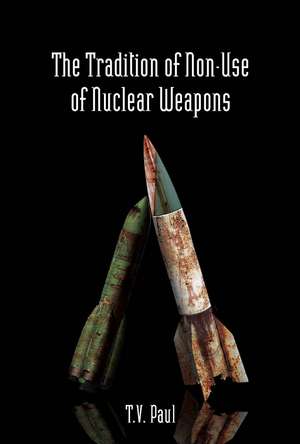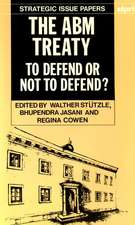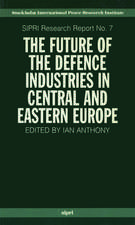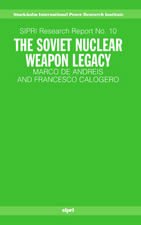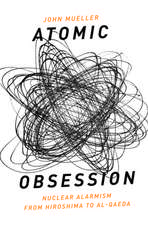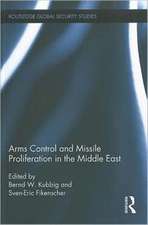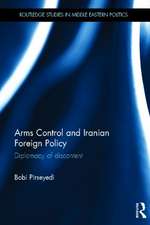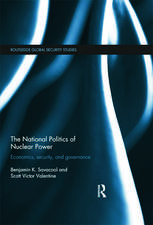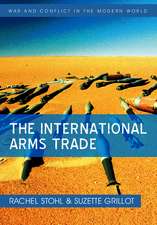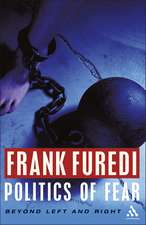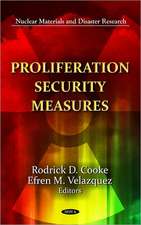The Tradition of Non-Use of Nuclear Weapons
Autor T. V. Paulen Limba Engleză Hardback – 22 ian 2009
Since the Hiroshima and Nagasaki attacks, no state has unleashed nuclear weapons. What explains this? According to the author, the answer lies in a prohibition inherent in the tradition of non-use, a time-honored obligation that has been adhered to by all nuclear states—thanks to a consensus view that use would have a catastrophic impact on humankind, the environment, and the reputation of the user.
The book offers an in-depth analysis of the nuclear policies of the U.S., Russia, China, the UK, France, India, Israel, and Pakistan and assesses the contributions of these states to the rise and persistence of the tradition of nuclear non-use. It examines the influence of the tradition on the behavior of nuclear and non-nuclear states in crises and wars, and explores the tradition's implications for nuclear non-proliferation regimes, deterrence theory, and policy. And it concludes by discussing the future of the tradition in the current global security environment.
The book offers an in-depth analysis of the nuclear policies of the U.S., Russia, China, the UK, France, India, Israel, and Pakistan and assesses the contributions of these states to the rise and persistence of the tradition of nuclear non-use. It examines the influence of the tradition on the behavior of nuclear and non-nuclear states in crises and wars, and explores the tradition's implications for nuclear non-proliferation regimes, deterrence theory, and policy. And it concludes by discussing the future of the tradition in the current global security environment.
| Toate formatele și edițiile | Preț | Express |
|---|---|---|
| Paperback (1) | 199.30 lei 3-5 săpt. | |
| Stanford University Press – 22 ian 2009 | 199.30 lei 3-5 săpt. | |
| Hardback (1) | 777.35 lei 6-8 săpt. | |
| Stanford University Press – 22 ian 2009 | 777.35 lei 6-8 săpt. |
Preț: 777.35 lei
Preț vechi: 1009.54 lei
-23% Nou
Puncte Express: 1166
Preț estimativ în valută:
148.76€ • 155.12$ • 123.64£
148.76€ • 155.12$ • 123.64£
Carte tipărită la comandă
Livrare economică 20 martie-03 aprilie
Preluare comenzi: 021 569.72.76
Specificații
ISBN-13: 9780804761314
ISBN-10: 0804761310
Pagini: 336
Dimensiuni: 152 x 229 x 25 mm
Greutate: 0.54 kg
Editura: Stanford University Press
Colecția Stanford Security Studies
ISBN-10: 0804761310
Pagini: 336
Dimensiuni: 152 x 229 x 25 mm
Greutate: 0.54 kg
Editura: Stanford University Press
Colecția Stanford Security Studies
Recenzii
"This book is an excellent resource for students, scholars, and the policy community. It is well written and accessible, and appropriate for course use for advanced undergraduates and graduate students. Scholars studying deterrence, the military role of nuclear weapons, and proliferation would all find the author's analysis of use. Finally, policymakers concerned with defense policy and nuclear proliferation would be well advised to take heed of the interaction between the tradition of non-use, nuclear deterrence, and proliferation incentives."—International Studies Review
"Paul's framework is a timely and important contribution to the nuclear debate that incorporates valuable perspectives from both the rationalist and ideational perspectives. As the issues of arms control, force structure, and disarmament inevitably become mired in political trench warfare, creative and eclectic thinking on nuclear issues will be at a premium. The Tradition of Non-use of Nuclear Weapons stands to provide an example of the rigorous scrutiny to which classic paradigms must be subjected in the search for real-world policy solutions."—Joint Forces Quarterly
"Paul builds on the impressive progress by scholars of deterrence, especially on the crucial concept of reputation. Unlike much of deterrent scholarship, which stresses reputation for credibility, Paul is more concerned with reputation in the form of esteem. Non-use, he argues, is a social norm based on calculation of interest. Like Joseph Nye's work on soft power, Paul sees states restrained by their need for acceptance or support. Time and again, his scholarship reveals decision-makers pre-occupied not by the anguish of violating a moral taboo, but by fear of antagonizing various audiences, above all other states."—Contemporary Security Policy
"T.V. Paul has provided a solid, useful explanation of the major sources of that tradition and of the threats to its continuation. Both academics and policy makers would do well to pay attention to his work."—Nonproliferation Review
"Paul has produced an excellent book. The central argument that a tradition of non-use has restrained the use of nuclear weapons is well-developed and largely convincing. Although the extent of this influence is, of course, debatable, Paul succeeds in exploring the historical influence and broader implications of the tradition. This book therefore makes an important contribution to the growing body of literature considering the non-use of nuclear weapons."—International Affairs
"Paul has written an interesting and useful book. He highlights the continuing, and perhaps increasing, dangers of nuclear use and the importance of maintaining the tradition of non-use."—John Baylis, University of Swansea
"This is one of the best books on nuclear policy since George and Smoke's classic, Deterrence in American Foreign Policy. It is a major and original contribution to our theoretical understanding and our empirical knowledge of nuclear weapons." —John A. Vasquez, Thomas B. Mackie Scholar in International Relations, University of Illinois at Urbana-Champaign
"An impressive and nuanced assessment, at once wide-ranging and focused." —John Mueller, Professor of political science at Ohio State University and author of the forthcoming Atomic Obsession
"The most astonishing event of the twentieth century did not occur: no nuclear weapons used in warfare since the two on Japan in August, 1945. Here is the first thorough history of the evolution of that powerful, completely unpredicted, tradition, with analysis of how to maintain and strengthen it."—Thomas Schelling, Nobel Laureate in Economics and Distinguished University Professor, School of Public Policy, University of Maryland
"T.V. Paul, a distinguished academic . . . has made a valuable contribution to exploring the historical experience of the non-use of nuclear weapons and the challenges now faced globally."—Chitrapu Uday Bhaskar, The Hindu
"Paul has written an interesting and useful book. He highlights the continuing, and perhaps increasing, dangers of nuclear use and the importance of maintaining the tradition of non-use."—John Baylis, University of Swansea
"This is one of the best books on nuclear policy since George and Smoke's classic, Deterrence in American Foreign Policy. It is a major and original contribution to our theoretical understanding and our empirical knowledge of nuclear weapons." —John A. Vasquez, Thomas B. Mackie Scholar in International Relations, University of Illinois at Urbana-Champaign
"An impressive and nuanced assessment, at once wide-ranging and focused." —John Mueller, Professor of political science at Ohio State University and author of the forthcoming Atomic Obsession
"The most astonishing event of the twentieth century did not occur: no nuclear weapons used in warfare since the two on Japan in August, 1945. Here is the first thorough history of the evolution of that powerful, completely unpredicted, tradition, with analysis of how to maintain and strengthen it."—Thomas Schelling, Nobel Laureate in Economics and Distinguished University Professor, School of Public Policy, University of Maryland
"T.V. Paul, a distinguished academic . . . has made a valuable contribution to exploring the historical experience of the non-use of nuclear weapons and the challenges now faced globally."—Chitrapu Uday Bhaskar, The Hindu
Notă biografică
T.V. Paul is James McGill Professor of International Relations, McGill University and Director, University of Montreal-McGill Research Group in International Security. He has published eight books including Balance of Power: Theory and Practice in the 21st Century (with James Wirtz and Michel Fortman, Stanford, 2004).
Descriere
An exploration of the rise, persistence, and impact of the tradition of non-use of nuclear weapons followed by nuclear powers for well over sixty years.
